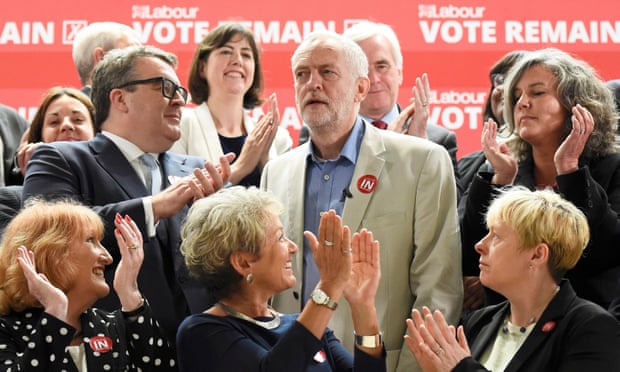We are developing the social individualist meta-context for the future. From the very serious to the extremely frivolous... lets see what is on the mind of the Samizdata people.
Samizdata, derived from Samizdat /n. - a system of clandestine publication of banned literature in the USSR [Russ.,= self-publishing house]
|
A friend of mine reckons that Ex-Prime-Minister David Cameron’s plan was, all long, to extricate Britain from the EU. This theory reminds me of the similar things that were said about Gorbachev and the collapse of the old USSR. If Gorbachev had been a CIA agent, working to contrive the exact USSR collapse that happened, what would he have done differently? Very little. It’s the same with Cameron and Brexit. How could Cameron have done a better job of contriving Brexit than he actually did do?
You may say: Cameron might actually have argued for Brexit, in public. But if he had done that, then many of those north of England Labourites who hate Cameron might have voted Remain instead of Out, just to stick it to those out-of-touch Etonian bastards, the way they actually did feel they were sticking it to the Etonians by voting Out. And Britain might now be chained to the sinking ship that is the EU rather than liberated from it.
But, whether by design, as my friend thinks, or by accident, as most others assume, Brexit has unified the Conservative Party. With that observation, I move from the territory of undisprovable speculative diversion into the land of out-in-the-open truth. And I am not the only one who has noticed this.
For all of my adult life, the Europe issue has divided the Conservative Party. Until now.
→ Continue reading: How Brexit has unified the Conservative Party
“Those who would give up essential Liberty, to purchase a little temporary Safety, deserve neither Liberty nor Safety.”
It has been fifteen years. Throughout that time most people, however much or little they valued liberty, have talked as if a loss of liberty were the price of increased security. Even Benjamin Franklin’s famous words quoted above assume this tradeoff.
What if it were not true? In what ways could more liberty bring about more safety?
In 1916 Geoffrey Malins, a cinematographer, toured the Western Front filming what he saw. The footage was edited into an hour-long film that was shown in British cinemas. The Battle of the Somme was an extraordinary success with some estimating that it was the most watched movie in British history. Clips from it still regularly turn up when TV people want to refer to the war.
But it didn’t please everyone. The Dean of Durham has this to say:
I beg leave respectfully to enter a protest against an entertainment which wounds the heart and violates the very sanctities of bereavement.
The bereaved – or at least some of them – had different ideas:
Well, I have lost a son in battle, and I have seen the Somme films twice. I am going to see them again. I want to know what was the life, and the life-in-death, that our dear ones endured, and to be with them again in their great adventure.
My guess is that the Dean of Durham is referring above all to one particular scene; that scene, the famous scene, the one we are all familiar with, the one that above all others has come to represent the First World War. This one:
 Sadly, I wasn’t able to track down the actual clip which has more evidence of fakery but even in this frame the puniness of the barbed wire and the lack of large packs suggest this was shot some distance from the front. Which is a pity. Because it is a fake.
People vote for socialist policies. Time goes by. Things get worse. Time goes by. People vote out the socialist policies. Time goes by. Things get better. Time goes by. People forget what it was like before. Time goes by. People vote for socialist policies. The fundamental things apply…
Here’s why renationalisation won’t make the trains run on time
When Owen Smith was asked at his Labour leadership launch about his stance on railways, he replied, “I would re-nationalise our railways tomorrow.” Needless to say, this went down well. In August last year, a YouGov poll found that 58% of the British public support renationalising the railways compared to just 17% who oppose it. The irony will not be lost on followers of the Labour party who may remember that renationalisation of the railways was Corbyn’s first official policy as Labour leader. Recently, Corbyn has thrust this issue back into the spotlight, jumping on the recent troubles of Southern Rail.
To set the scene, until 1994, the railway network in the UK was operated by the Government-controlled and owned British Rail. The Railways Act 1993 started the break-up of British Rail and the privatisation process concluded in 1997. The operation of passenger services is now contracted out under a system of franchising.
… Croatia’s Operation Storm was in day two of a rapid offensive to recapture the bulk of its territory from Belgrade backed separatists. It was the largest European land battle since the Second World War, ending on 7 August 1995 with the reoccupation of 4,000 square miles of territory. This was a dramatic demonstration of how effective the Croatian Army (HV) had become compared to just a few years earlier, and Operation Storm also represented a strategic victory for the Bosnian government as it broke the long siege of the Bihać enclave.
Like all wars, it was not pretty, but it ended as it started, as an ethnic struggle with winners and losers and there is no point in thinking otherwise, and the less bad guys won in my opinion.
Although Op. Storm did not end on August 5th, many Croatians see the HV recapture of Knin on this date as the most symbolic. It feels strange to me to tag this as ‘historical views’ as saw a great deal of that war first hand. I am getting old 😀
If you type “window tax” into google, and click on “images”, you get images like this one:

That being the first image that wikipedia shows you, in their entry on the Window tax.
Says wikipedia about this tax:
The window tax was a property tax based on the number of windows in a house. It was a significant social, cultural, and architectural force in England, France, Ireland and Scotland during the 18th and 19th centuries. To avoid the tax some houses from the period can be seen to have bricked-up window-spaces (ready to be glazed or reglazed at a later date). In England and Wales it was introduced in 1696 and was repealed in 1851,
London, and presumably all the other cities of Britain, still contain many such bricked-up windows, that date from this time.
But yesterday, I saw a new block of flats, still in the process of being constructed, just a few dozen yards from my own front door.
The front of which looks like this:

Let me be clear. There is a vertical row of bricked-up windows there, in between the real windows. And you can clearly see that this is a brand new building, not even yet occupied.
Here is a close-up shot of an individual bricked-up window:

I have long known the bare outlines of this window tax story, as I guess most of my fellow Brits do also, especially if they live in towns or cities. Windows were taxed, so people filled the windows in, to avoid paying the tax.
So, my first – outraged and spasmodic – reaction to this new building, when I saw these non-windows was: My God, have they brought back the window tax?
But, on further reflection, I further guess that this is isn’t the first time that recent property developers have created bricked-up windows, or what look like bricked-up windows, to create, pretty cheaply, the suggestion of antiquity in an otherwise blandly modern building.
When I see other bricked-up windows, I will no longer assume that they date from the time of the window tax. Maybe they merely allude to this time.
But, am I missing something? Is there a more practical purpose to such non-windows? Is it helpful to create windows that can later be un-bricked-up (bricked-down?), at some future date? Does it help to think about maybe wanting a window that you don’t want now, beforehand, just in case?
Is this a mere part of the construction process. Will these bricked-up windows all turn into real windows very soon, before anyone even moves in?
Or are there quite different reasons for making a new bricked-up window, which I am unaware of? Perhaps so. In fact, probably so. And if so, I hope that commenters will perhaps enlighten me.
Via Mick Hartley, I came upon this summary of the state of the Middle East, and in particular of the bloody shambles that was the attempt to unite Sunni Islam, aka: the Arabs. It’s the best background briefing I have recently read on that deeply depressing region of our otherwise moderately undepressing world. Although, that doesn’t say much for I am no sort of Middle East expert, nor even much of an observer of it. Too depressing. But I read all of this piece, by Ofir Haivry of the Herzl Institute in Jerusalem, at one sitting as soon as I encountered it, which is quite rare for me and my crumbling attention span.
I haven’t much to say about all this, but one thought does occur to me, which is that it seems rather wrong for Americans to blame other Americans for this bloody shambles. (Haivry himself does not blame America.) The next silliest thing to believing that your country is an unchallengeably magnificent superpower that never ever errs is to believe that your country’s mistakes and crimes are overwhelmingly more important and blameworthy than those of any other country, these two attitudes being far more similar than those who indulge in the latter one typically realise. The Middle East would surely now be a bloody shambles whatever the Americans had recently tried to do about it.
If there are imperialist villains to be blaming, how about Britain and France? But one suspects that, again, even if those notorious “lines in the sand” had never been drawn around a century ago, what would be happening on top of this sand would still now be a bloody shambles.
The only rays of light that Haivry discerns are in the form of the various little non-Islamic and anti-Islamist statelets that are starting to form, such as the newly emerging Kurdistan. The Kurds aren’t the only ones doing this, apparently. Good to hear.
And then of course there is the continuing success of Israel. A particular reason I am convinced by this article is that Israelis cannot afford to be wrong, and in particular they cannot afford to be sentimental, about what is going on around them.
Talking of sentimental, “Lawrence of Arabia” gets a well-deserved swipe of criticism.

Flourish. Enter CAESAR; ANTONY, for the course; CALPURNIA, PORTIA, DECIUS BRUTUS, CICERO, BRUTUS, CASSIUS, and CASCA; a great crowd following, among them a Soothsayer.
When I started writing this posting, the invaluable Guido Fawkes had, at the top of his invaluable ongoing list of “seen elsewhere” items, a link to a Conservative Home piece by David Davis MP, with a long title on top of it which includes the words A Brexit economic strategy for Britain.
It deserves to be quoted at length, so I will now do that:
… [L]eaving the EU gives us back control of our trade policy, and gives us the opportunity to maximise returns from free trade.
Because any deals currently settled are obtained by finding a 28 nation compromise, the EU is clumsy at negotiating free trade deals. That is why we currently only have trade deals with two of our top ten non-EU trading partners. This is incredibly important to us, as about 60 per cent of our trade is with the non-EU world. In fact, we sell as much to non-EU countries with which we have no trade agreements as we do to the EU.
The first order of business is to put that right. As the amicable statements coming from the US, Australia, China and India show, these countries are as keen to knock down trade barriers as we are.
Single countries, with the ability to be flexible and focussed, negotiate trade deals far more quickly than large trade blocs. For example, South Korea negotiated a deal with the US in a single year, and with India, which is notoriously difficult, within three years. Chile was even faster, negotiating trade deals with China, Australia and Canada in under a year.
The EU, by comparison, takes more than six years to negotiate trade deals; the deals which would most benefit us, such as those with Canada or the US, take even longer. And without the often conflicting requirements of 28 different countries to consider, deals negotiated by single countries tend to be broader and have more favourable terms on matters that are important to us, such as services.
So be under no doubt: we can do deals with our trading partners, and we can do them quickly. I would expect the new Prime Minister on September 9th to immediately trigger a large round of global trade deals with all our most favoured trade partners. I would expect that the negotiation phase of most of them to be concluded within between 12 and 24 months.
So within two years, before the negotiation with the EU is likely to be complete, and therefore before anything material has changed, we can negotiate a free trade area massively larger than the EU. Trade deals with the US and China alone will give us a trade area almost twice the size of the EU, and of course we will also be seeking deals with Hong Kong, Canada, Australia, India, Japan, the UAE, Indonesia – and many others.
So much for the “jump-start” bit. Now for my own additional argument that this could well happen very quickly.
→ Continue reading: How Brexit could jump-start the British economy – and do it very quickly
The BBC has provided a reminder of the distant past, the early 1970s, when Ted Heath was Prime Minister and Mrs Thatcher was the Education Secretary. Despite a long feud between them after Mrs Thatcher’s rise to lead their party, Mrs Thatcher reportedly thought highly of Mr Heath.
‘…Baroness Thatcher eventually called her Tory predecessor “one of Britain’s greatest prime ministers”….’
Let’s see what the BBC has to say about that time:
Margaret Thatcher was Education Secretary in Mr Heath’s cabinet between 1970 and 1974. Although never close, they shared a commitment to free market policies.
As if. It is true that Mr Heath privatised Thomas Cook, a travel agency (it was nationalised during World War 2 after the German occupation of France as it had become French-owned by then), and some pubs in Carlisle. Yes, that’s right, the British Government had nationalised pubs around Carlisle during WW1, to ensure that munitions workers weren’t too drunk, and with the Kaiser safely in the past, the time was ripe for final privatisation of the remaining pubs came in 1971.
Perhaps every town should have a nationalised pub as a reminder of the ordeal of the drinkers of Carlisle, which effectively lasted a drinker’s lifetime. At a relatively small cost, we could have a live reminder of nationalisation in every town.
From 1972, the government began to change course.
A strike by the miners threatened coal supplies to power stations.
War in the Middle East in 1973 led to a sharp rise in oil prices, feeding inflation.
Inflation, that mysterious dragon that is scared off by high interest rates but which feeds on high oil prices, so the collapse of Bretton Woods and Nixon’s repudiation of the dollar/gold link had nothing to do with inflation, nor did wild printing of money.
Here is a pub price list from the time of decimalisation, 30th November 1970: A pint of beer in the same pub now, even with gentrification, costs not 12 new pence but something in the region of £3.60p, a 30-fold price increase in nominal terms.

However, what did Mr Heath, one-time friend of Deng and Saddam, decide to do in the face of inflation, and demands for pay rises? Reminder, a great many people worked in nationalised industries, and their pay rates were ultimately political decisions. Furthermore, going on strike (i.e. refusing to work) was often seen as the way to muscle a pay rise out of the government, rather than a route to bankruptcy.
Heath, memories of wartime comradeship still fresh, did not want a confrontation with workers, nor, having grown up during the depression of the 1930s, was he willing to see unemployment rise in order to curb inflation.
Instead, he re-introduced government control of prices and pay.
So what happens if you control prices and pay? We are not told. Is it too obvious to need to be said, or are there still people who deny that price controls can lead to distortions? Why not look at Venezuela for a grim current example? (it’s OK, he’s doing it to curb inflation).
And this ‘trade-off’ between unemployment and inflation? That other mysterious relationship that is simply assumed to exist? How about seeing if a market can clear without distortions?
And note, there was no dispute at this point between Mr Heath and Mrs Thatcher over Europe, Mrs Thatcher was completely for membership of the European Economic Community.
In some ways, we have come a long way from the absurdity of the political consensus of the 1970s, yet the State still looms large as does the passing off of old economic fallacies as realities.
And what is Mrs Thatcher reported to have said of that time?
“In the years since, he and I have not always agreed on every political thing, but I was, and I’m proud to have been, a member of his government …”
Quite how Mrs Thatcher got her reputation is a mystery to me, but not how Roy Orbison put it.
Amidst everything else that’s been going on over the last few days, Britain managed to commemorate the centenary of the first day of the Somme. For those who are unaware of the details 60,000 soldiers of a volunteer army became casualties, 20,000 died while the gains in terms of territory and dead Germans were minimal. While I found most of the commemorations cloying I thought the decision to dress up a bunch of young men in First World War uniforms and strategically position them in our larger cities was an act of genius.
But sadness and horror does not excuse the abandonment of cognitive functions. Many are happy to blame bad generalship and from the sounds of it there was plenty present that day but there were other, deeper, strategic reasons for the disaster.
First of all, Britain was fighting a war in Western Europe against a large, well-equipped and tactically skillful enemy. That is a recipe for a bloodbath. Britain repeated the exercise twice in the Second World War (May 1940 and June 1944 onwards). They were bloodbaths too. We tend to forget that fact because overall the numbers killed in the Second World War were much lower than than the First and because they achieved a succession of clear victories.
Secondly, Britain began the war with a small army. To make a worthwhile contribution Britain was going to have to raise and train a large army. Soldiering, like any other job, is one where experience counts. Anyone who is familiar with the rapid expansion of an organisation will know that this is a recipe for confusion and chaos. In the case of the British army the inexperience existed at all levels. Corporals were doing the jobs of Sergeant Majors, Captains doing the jobs of Colonels and Colonels doing the jobs of Generals. Haig himself (according to Gary Sheffield) was doing jobs that would be carried out by three men in the Second World War. Talking of the Second World War, it is worth pointing out that it took three years for the British to achieve an offensive victory (Alamein) over the Germans which is much the same as the First (Vimy).
Thirdly, Britain began the war with a small arms industry. Expanding that involved all the problems mentioned above plus the difficulty in building and equipping the factories. It comes as no surprise that many of the shells fired at the Somme were duds and even if they were working they were often of the wrong type: too much shrapnel, not enough high explosive.
Fourthly, the Allies needed to co-ordinate. Co-ordinating your efforts means that the enemy cannot concentrate his efforts on one of you and defeat you in detail. This was the thinking behind the Chantilly agreement of December 1915. The idea was that the allies – France, Russia, Britain and Italy – would all go on the offensive at the same time. Russia had done her bit in the Brusilov offensive. Now it was Britain and France’s turn.
Fifthly, the battle of Verdun. It is almost impossible to put into words the desperation of the French army by June 1916. It was fighting against a skillful and determined enemy for what had become sacred ground. It had reached the end of its tether and Britain had no choice but to come to its aid by fighting and thus drawing off the German effort. The original intention was for the more experienced French to have a much larger role at the Somme. Verdun put paid to that which meant that the British had to take the lead. As it happened, the Germans ended offensive operations at Verdun shortly after the battle began.
 British troops attacking German trenches near Mametz, on first day of the Somme. From here: https://twitter.com/prchovanec_hist/status/749031026039586816
|
Who Are We? The Samizdata people are a bunch of sinister and heavily armed globalist illuminati who seek to infect the entire world with the values of personal liberty and several property. Amongst our many crimes is a sense of humour and the intermittent use of British spelling.
We are also a varied group made up of social individualists, classical liberals, whigs, libertarians, extropians, futurists, ‘Porcupines’, Karl Popper fetishists, recovering neo-conservatives, crazed Ayn Rand worshipers, over-caffeinated Virginia Postrel devotees, witty Frédéric Bastiat wannabes, cypherpunks, minarchists, kritarchists and wild-eyed anarcho-capitalists from Britain, North America, Australia and Europe.
|











